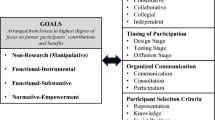Abstract
This paper examines the adoption and application of a participatory approach to the transfer of scientific research to farmers with the objective of supporting government policies for sustainable agriculture. Detailed interviews with scientists and farmers in two case studies in New Zealand are used to identify the potential and constraints of such an approach. One case study involves Māori growers wishing to develop organic vegetable production; the other involves commercial wheat farmers who want to improve their profitability and face major problems of groundwater nutrification. The paper concludes that while both case studies are characterized as successful by those involved, there is an inherent creative tension between the adoption of a participatory approach and its use to advance public policy goals.
Similar content being viewed by others
Abbreviations
- CFR:
-
Crop and Food Research
- ECOP:
-
East Coast Organic Producers Trust
- FRST:
-
Foundation for Research, Science, and Technology
- FAR:
-
Foundation for Arable Research
References
Allen, W., M. Kilvington, C. Nixon, and J. Yeabsley (2002). Sustainable Development Extension. MAF Technical Paper No. 2002/03. Wellington, New Zealand: Ministry of Agriculture and Forestry (MAF)
Bentley J. W. (1994). Facts, fantasies and failures of farmer participatory research. Agriculture and Human Values 11: 140–150
Biggs S., Smith G. (1997). Beyond methodologies: Coalition-building for participatory technology development. World Development 26: 239–248
Campbell A. (1998). Fomenting synergy: Experiences with facilitating landcare in Australia. In: N. Röling, Wagemakers A. (eds.) Facilitating Sustainable Agriculture: Participatory Learning and Adaptive Management in Times of Environmental Uncertainty. (pp. 232–249). Cambridge, UK: Cambridge University Press
Cary J., Webb T., Barr N. (2002). Understanding Landholders Capacity to Change to Sustainable Land Practices. Canberra, Australia: Bureau of Rural Sciences
Chambers R. (1994). The origins and practice of participatory rural appraisal. World Development 22: 953–969
Cooke, B. and U. Kothari (eds.) (2001). Participation: The New Tyranny? London, UK: Zed Books Ltd
Curry N., Winter M. (2000). The transition to environmental agriculture in Europe: Learning processes and knowledge networks. European Planning Studies 8: 107–121
Durie M. (1998). Te Mana, Te Kawanatanga: The Politics of Māori Self-Determination. Auckland, New Zealand: Oxford University Press
Eshuis J., Stuiver M. (2005). Learning in context through context and alignment: Farmers and scientists in search of sustainable agriculture. Agriculture and Human Values 22: 137–148
Friere P. (1970). Pedagogy of the Oppressed. New York: Continuum
Forester J. (1999). The Deliberative Practitioner: Encouraging Participatory Planning Processes. Cambridge, Massachussets: MIT Press
Hayward C., Simpson L., Wood L. (2004). Still left out in the cold: Problematising participatory research and development. Sociologia Ruralis 44: 95–108
Keen M., Mahanty S. (2005). Collaborative learning: Bridging scales and interests. In: Keen M., Brown V., Dyball R. (eds.) Social Learning in Environmental Management: Building a Sustainable Future. (pp. 104–119). London, UK: Earthscan
Kothari U. (2001). Power, knowledge, and social control in participatory development. In: Cooke B., Kothari U. (eds.) Participation: The New Tyranny? (pp. 139–152). London, UK: Zed Books Ltd
Leeuwis C., Pyburn R. (2002). Social learning for rural resource management. In: Leeuwis C., Pyburn R. (eds) Wheelbarrows Full of Frogs: Social Learning in Rural Resource Management. (pp. 11–21). Assen: Koninklijke van Gorcum
Lewin K. (1946). Action research and minority problems. Journal of Social Issues 2: 34–46
Murray P. (2000). Evaluating participatory extension programs: Challenges and problems. Australian Journal of Experimental Agriculture 40: 519–526
Pain R., Francis P. (2003). Reflections on participatory research. Area 35: 46–54
Paolisso M., Maloney R. (2000). Recognizing farmer environmentalism: Nutrient runoff and toxic dinoflagellate blooms in the Chesapeake Bay region. Human Organization 59: 209–221
Park P. (1993). What is participatory research? A theoretical and methodological Perspective. In: Park P., Brydon-Miller M., Hall B., Jackson T. (eds.) Voices of Change: Participatory Research in the United States and Canada. (pp. 1–19). Westport, Connecticut: Bergin and Garvey
Parliamentary Commissioner for the Environment (2004). Growing For Good: Intensive Farming, Sustainability and New Zealand’s Environment. Wellington, New Zealand: Parliamentary Commission for the Environment
Pretty J. (1995). Participatory learning for sustainable agriculture. World Development 23: 1247–1263
Reason, P. and H. Bradbury (2001). “Introduction: inquiry and participation in search of a world worthy of human aspiration.” In P. Reason and H. Bradbury (eds.), Handbook of Action Research: Participative Inquiry and Practice (pp. 1–14). London: Sage Publications Ltd
Reijntjes C., Haverkort B., Waters-Bayer A. (1992). Farming for the Future: An Introduction to Low-External-Input and Sustainable Agriculture. London, UK: MacMillan
Röling, N. and J. Pretty (1998). “Extension’s role in sustainable agricultural development.” In B. Swanson, R. Bentz, and A. Sofranko (eds.), Improving Agricultural Extension: A Reference Manual. Rome, Italy: Food and Agriculture Organization of the United Nations (FAO). http://www.fao.org/docrep/W5830E/W5830E00.htm#Contents
Röling, N. and A. Wagemakers (eds.) (1998). “A new practice: Facilitating sustainable agriculture.” In N. Röling and A. Wagemakers (eds.), Facilitating Sustainable Agriculture: Participatory Learning and Adaptive Management in Times of Environmental Uncertainty (pp. 3–22). Cambridge, UK: Cambridge University Press
Stoecker R. (2005). Research Methods for Community Change: A Project-Based Approach. Thousand Oaks, CA: Sage Publications
Tilt B. (2006). Perceptions of risk from industrial pollution in China: A comparison of occupational groups. Human Organization 65: 115–127
Vanclay F., Lawrence G. (1995). The Environmental Imperative: Eco-social Concerns for Australian Agriculture. Rockhampton, Australia: Central Queensland University Press
Wilkinson R., Cary J. (2002). Sustainability as an evolutionary process. International Journal of Sustainable Development 5: 382–393
Author information
Authors and Affiliations
Corresponding author
Additional information
Murray Bruges is a geographer and Research Associate in the School of Geography, Geology, and Environmental Science at the University of Auckland.
Willie Smith is a geographer and Director of the School of Geography, Geology, and Environmental Science at the University of Auckland and has a background in public policy.
Rights and permissions
About this article
Cite this article
Bruges, M., Smith, W. Participatory approaches for sustainable agriculture: A contradiction in terms?. Agric Hum Values 25, 13–23 (2008). https://doi.org/10.1007/s10460-007-9058-0
Received:
Accepted:
Published:
Issue Date:
DOI: https://doi.org/10.1007/s10460-007-9058-0




